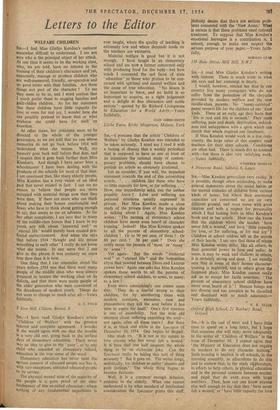SIR,—I presume that the article ' Children of Welfare' by
Gladys Kendon was intended to he taken seriously. I must say I read it with a feeling of dismay that a weekly periodical that is supposed to have as one at least of its intentions the rational study of contem- porary problems, should have chosen to publish an article so obviously irrational.
Let us consider, if you will, the impudent statement, towards the end of this astonishing article. . . children like these who have so little capacity for love, or for suffering....' How, one immediately asks, can the author possibly know? Love and suffering are personal emotions usually expressed in private. Has Miss .Kendon made a close study of the private lives of the people she is talking about ? Again, Miss Kendon writes: ' The parent; of elementary school children have never even heard of character training.' Indeed! Has Miss Kendon spoken to all the parents of elementary school- children ? Or to 90 per cent. of them ? Or 80 per cent. ? 50 per cent. ? Docs she really mean the parents of ' most' or ' many' or ' some' ?
Yet again: ' Say the words " immortal soul " or " eternal life " and the bottomless abyss that yawned between Dives and Lazarus yawns here.' Again one asks has Miss Kendon spoken those words to all the parents of elementary school children, to some, to many, to a few 7
Even more astonishingly one comes upon this: ' They do a fearful wrong to their children, for by smothering them with modern comforts, amenities, ease and pleasantness they kill the soul before it has time to aspire for itself.' One's first reaction is one of incredulity. Not the stale old chestnut about suffering ennobling the soul— not again, after all these years ! But there it is, in black and white in the Spectator of December 10, 1954. One begins to despair.
One reads on. `It is not in my nature to love anyone who has never felt a wound.' It is here that one half suspects the whole thing to he an elaborate joke. Can the Spectator really be taking this sort or thing seriously ? But it goes on. The writer longs, sadistically, for children to suffer 'shames and guilt feelings.' The whole thing begins to become fantastic. Nobody denies that there are serious probe lems connected with the ' New Areas.' WWI is certain is that these problems need rational treatment. To suppose that Miss Kendon's emotional harangue is a contribution is, I submit, enough to make one suspect the serious purpose of your paper.—Yours faith- fully,
NORMAN GEUR
139 Hale Drive. Mill Hill, N.W.7


































 Previous page
Previous page